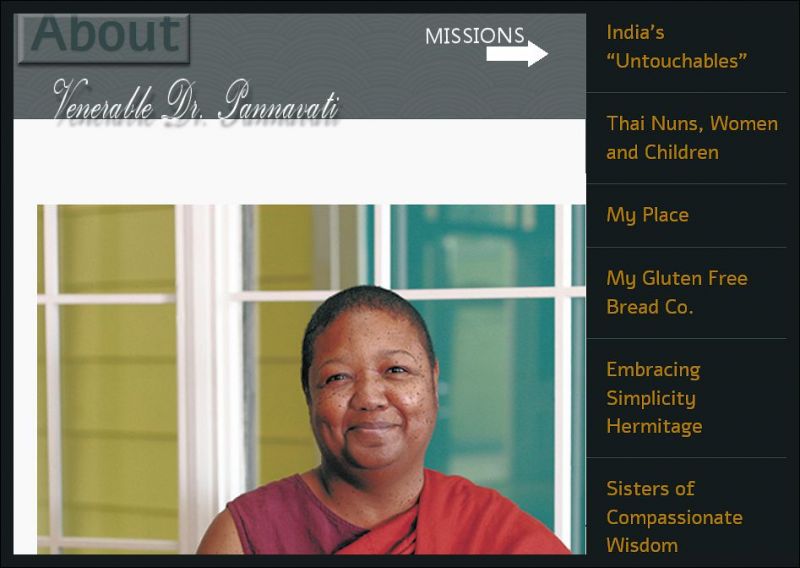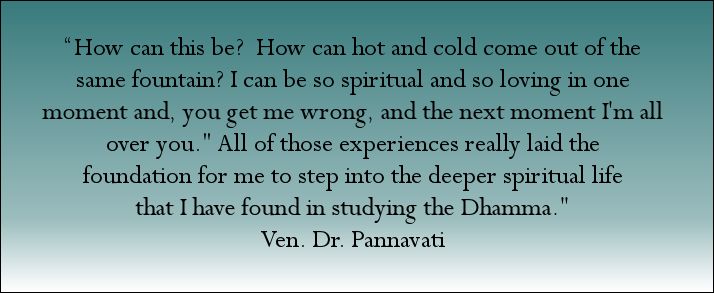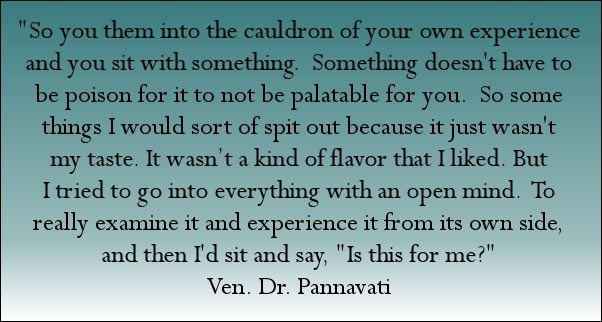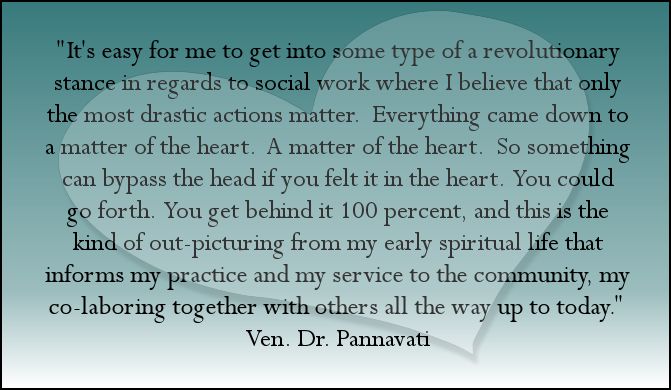It's A Matter Of The Heart

IT'S A MATTER OF THE HEART
I spent a lovely couple of hours on a Saturday afternoon last December listening to an interview with Venerable Pannavati. During the call, hosts Sriram Shamasunde and Afreen Malim spoke with Ven. Pannavati about the fascinating path of her life journey to her current missions, today. As I listened and, later, as I did research about Ven Pannavati’s life, a phrase kept recurring in my mind: “Massive action.”
The “About” section of her website lists Ven. Pannavati’s most recent endeavors, awards and missions. These are notable: In 2009, she was named one of the Outstanding Buddhist Women of the Year. In 2010 she went to Cambodia to ordain the first ten Bhikkhuni monks in Cambodian history. In 2011 she adopted ten “untouchable” villages in India and vowed to help them to establish an egalitarian community based on Buddhist principles of conduct and livelihood.
In 2011, a young man in India learned of Ven. Pannavati's unique qualifications and sent her an email.
He wrote, "I searched by way of Google for an African-American woman who had been an activist in the 60's and who was also a Buddhist nun. You were the only one qualified." The young man asked Ven. Pannavati to help mediate in his Dalit community in India. During the interview, she explained why she dropped everything to help a virtual friend-to-be:
.jpg)
"There's a lot of things I could be doing right here in America, but the reason I went is because the young man that invited me said, “In times past, we accepted this way of life. But our children of today, they do not accept it." He said, "They will fight for their freedom, but they will die." And that's why I came. I came to show them that there's a way to cut through ignorance without picking up weapons and fighting."
Here, below, are some excerpts from the December 20, 2014 call with Ven. Pannavait, and hosts Sriram Shamasunder and Afreen Malim.
_______________
SRIRAM
Can you tell us about the spiritual context of your childhood?
VEN. PANNAVATI
Being an African American, we're very passionate about our religion and our practice. My family was not that religious. My brother would take my sister and myself. It was a wonderful place for me. I would go every day of the week if I could. The joy that seemed to be there, the camaraderie, the real interest, the getting into the Bible, the trying to understand what it means. We needed some kind of faith, something to grasp and hold to in our ancestral slavery in this country. And I think that that's one reason why, perhaps, Buddhism is not as attractive to African Americans as a whole as some other Theistic type of religion. We come from a time where we had masters, and even in the times that I was still in church, we went to church to get fussed at, yelled at, every Sunday. Pastor would tell us what we needed to do, and we would say,
"Sure. You're right. Amen. Hallelujah!"
.jpg)
So there's a time gap in the process here. We haven't spent the last 200 years being whatever we wanted to be, doing whatever we wanted to do, having whatever we wanted to have until we're just sick of ourselves and looking for a way out. Most of us are still looking for a way in. We're waiting for our ship to come in. We're still looking for that fame, looking for prosperity, looking for acceptance. So, I'm often asked why there are not more African Americans on the Buddhist path, and I think this is one reason. It's not the only reason, but this is one reason.
And so being so fervent in my spiritual practice as a Christian I think set my whole life into motion and put me on a course to be fervent about everything. There's a scripture that talks about "The fervent effectual prayer of the righteous avails much." So it's easy for me to get into some type of a revolutionary stance in regards to social work where I believe that only the most drastic actions matter. Everything came down to a matter of the heart. A matter of the heart. So something can bypass the head if you felt it in the heart. You could go forth. You get behind it 100 percent, and this is the kind of out-picturing from my early spiritual life that informs my practice and my service to the community, my co-laboring together with others all the way up to today.
SRIRAM
Wow. I've never heard that explanation of why there are not more African Americans in Buddhism, and I think that that makes sense in a lot of ways. Does that sit well with your Baptist colleagues?
VEN. PANNAVATI
(laughs) Absolutely not. I haven't found too many people that sits well with. Nevertheless, I'm not saying that that is the reason. I'm just saying that is my view of one reason.
SRIRAM
You described one experience from when you were in the Baptist Church as a young woman where you start to speak in tongues, and the church said that that wasn't real. Can you talk a little bit about that, and about how you made sense of that experience at the time, and how you make sense of that experience today?

VEN. PANNAVATI
Yes. I was 13, and I'd been going to church since I was about 6 and I really loved it, and I would pray when I was home. It was like Jesus was a constant companion and thoughts of the holy life were on my mind the way you can make sense of it as a 13-year old. So one night when I was in bed, and I was just praying fervently, I felt this rush of energy just like coming up from out of my belly and it was so strong. And then it just spewed forth this -- I don't know -- it was this language and it wasn't that I understood what I was saying, but one thing I could definitely say was that I felt that I was in a washing. I was in a cleansing. Something was happening but it was erupting out of me. I went to church that Sunday and I told my pastor, and he said, "No no no no that passed away with the apostles." So then I decided, "Okay well you all can't help me because you don't even know what this is." So I decided to look for someplace to go. So I think it was my sister who said,
"You know they have these people that go to these storefront churches, and they call them “holy rollers.” They do that kind of thing. You know, they shout and they dance." And so, I went to check ‘em out. There I found community for a portion of my walk. I ultimately decided I got tired of breaking up the furniture shouting every Sunday and, stepped out the door, and if you got me wrong then you were in trouble.
I was like, "How can this be? How can hot and cold come out of the same fountain? I can be so spiritual and so loving in one moment and, you get me wrong, and the next moment I'm all over you." So that led me on what they call the "Word Churches" where we started really studying what the Scriptures meant and how to really walk in them, how to train the mind, and how to develop, to cultivate some qualities of being, not just in the spirit when the mood hits you but when it doesn't hit you. All of those experiences really laid the foundation for me to step into the deeper spiritual life that I have found in studying the Dhamma.
SRIRAM
That's beautiful. Between your slight pivot from Christianity to Buddhism, you describe these years of darkness. Can you speak a little more about that? What are the questions that you were asking yourself? How did that transition from Christianity to Buddhism occur?

VEN. PANNAVATI
I want to clarify. There weren't years of darkness. When I think of a "Dark Night of the Soul" I think of a person just not knowing. So darkness in the sense of ignorance, not necessarily harmfulness but confounded by the mystery of things and searching everywhere to try to find some clarity some answers about the meaning of life and who and what exactly is God or when I get some message about how to help someone and it was like a literally speaking in my ear and it's like, "Well what is that?"
I needed answers beyond "Oh that's the gift of the Holy Spirit," because I knew people who were better than me. I'll just tell you. I wasn't always that good. I still am not. But I felt if there was some gifts being handed out, there were a lot of people I could think of that would be ahead of me in the line. And so I needed another answer that made more sense. So I began searching.
I started with Unity because Unity is very close, like one hop away from mainstream Christianity and that felt comfortable. Someone before that had given me a Buddhist book, it was a Tibetan book on Dependent Origination, and when I saw the pictures that were just on the cover of the book I thought, "Well that's demonic. I don't want to even open this book. I don't want to have anything to do with this book," and I missed my opportunity for the Dhamma and it was 15 years before it came back around. But during that 15 years I definitely got ready for it. I touched so many things...Unity, U.U., shamanism, Taoism -- so just touching just about every spiritual discipline, just trying to investigate and understand the way things were.
So you put them into the cauldron of your own experience and you sit with something. Something doesn't have to be poison for it to not be palatable for you. So some things I would sort of spit out because it just wasn't my taste. Not judging that particular discipline, it just wasn't my taste. It wasn’t a kind of flavor that I liked. But I tried to go into everything with an open mind. To really examine it and experience it from its own side, and then I'd sit and say, "Is this for me?"
SRIRAM
What was it that finally drew you into the Dhamma?

VEN. PANNAVATI
I had always been compassionate, but I didn't have much wisdom. And that can really create problems for you and for other people. Early in my Christian walk some of my favorite passages were about wisdom: "Wisdom cries in the street." If wisdom cries in the street, how come I can't hear it? So I was always making mistakes out of a good heart but just not having enough wisdom. So that's what I was really looking for. As I begin to gradually move I guess towards this particular practice which I think is just the epitome of the wisdom path, I began to develop a little more confidence that I was developing wisdom, that I was learning something.
When Buddhism came in front of me, I was so ready for it. I had to get rid of so many fears before I was ready for it. I had to let go of so much clinging around certain notions, around certain beliefs. You know, you can have some experiences, and you don't know what they are about, by what means they have come about, or how to interpret them.
So when they occur within a certain vessel, then you kind of go with a certain explanation that the leaders of that boat tell you.
I knew that wisdom was developing because I was able to discriminate between the experience and the container. And that's when I knew I was making progress on the path. When I got into the Dhamma and the Dhamma really starts with this working -- you know -- it's a mind training -- I was ready for it.
SRIRAM
Can you talk about what is a day in the life of Ven Pannavati in terms of your practices? Are you meditating? Is it mostly service? Is it a combination of both? Is there chanting or other types of contemplation?

VEN. PANNAVATI
Every day is its own day. So we have to just show up and bear witness to the day and do what needs to be done. Sitting on the pillow, that's not practice. That's preliminary. Practice is what you do in the moment dealing with the vicissitudes of life. So Buddha says that we train sitting "quite secluded," from unwholesome mental states and from a lot of external distractions to learn how to center ourselves. He says, but it's no good if you can only do it when you're in a quiet room and sitting by yourself. It's when somebody's yelling at you, when somebody's calling you by the "N" word, or when somebody's following you around in the store. Then can you find it, that still space, in that moment. If so, then you're a practitioner.
So we learn to meditate at all times, on the pillow, off the pillow, when we're walking, when we're working. It becomes a state that you can find and be at peace and be focused no matter what's going on around you. So yes I have time for sitting every day, but that's because for me that time in a sitting meditation is like, for young people I would say like, it's like slipping away to see your lover. It's personal time. So I do it because I like being able to get away, to be alone with the stillness.
By continually dipping my toe in that stillness, I know where to find it, how to pull it up almost at any time and I know when that stillness in me is slipping away because I'm so familiar with it. So my day is mostly responding to whatever comes up…My day is just like your day. Well, I don't know if all monks' days are like mine. I made a decision that people are my forest. You said in your introduction that I was ordained a Mahayana and that's true but I was also ordained Theravada. That's my primary practice. It filters through all my other practices.
AFREEN
It's so lovely to hear the insightful conversation and share with you and Ven. Pannavati. I watched a video where you were sharing why you got involved with the community in India. It's very interesting to hear your insights into that history as well as the present community and what's currently living there.

VEN. PANNAVATI
I wasn't prepared for what I saw because I believed there were very few people in the world who had suffered more than those of us of African ancestry. But when I got there I was shocked and the fact that it could be -- you have to look really closely to see it -- everything is so well known how one should act or what one should do that a visitor or tourist might miss it completely. But being there with them for weeks and walking among them, I began to see the differences. And even when we go we have to be so careful about which hotels we select because some will not be welcoming to our Dalit sisters and brothers who just come and meet us for brainstorming sessions and that sort of thing.
I was asked to come in and to teach the Dhamma. About 250 converted from Hindi to Buddhism. They simply said that the Hindu faith offers them no hope of advancement and that's what they were looking for. So it wasn't so much that they were looking for a deep spiritual practice but they were looking for hope as a people for some way to encourage them to advance in society and just become human since they're considered non-human. So I realized that there was no point in trying to teach them the Dhamma per se. They needed an example.
So I said, "Okay well, we'll get to the Dhamma in a little while but right now you don't have water. So let's see if we can get you some water." So we were fundraising to build a well. And we completed one and we were working on our second well and we have a third well planned along with the school. So after water, you know, they don't have toilets either. Sanitation is really an issue. So many children are stunted in their intellectual capacity because of poor sanitation from parasites and things that affect their brain. So I said "Well now that you have water, maybe we need toilets and some training about sanitation."
When we went back a couple of weeks ago we started installing toilets. So it's kind of like that. You just start showing up to bear witness, seeing what's needed. In my tours we go with the express desire to lay down "we know what you need" kind of thing and to just be there with them. It does so much for them for us just to be there and to touch them because untouchability is the root of the issue. To just be able to just be embraced by us does so much for them. To get out and to work alongside them does so much for them.
So now we decided, "Well, they need education." Well, one the first schools we were working with, it's a Dalit school that didn't have any bathrooms. So they have a couple of hundred kids and no bathroom. So when I go back in March, the first thing I'm going to do is to put a bathroom into that school for the kids.
SRIRAM
Is it an organization that you connected to or is it a community that invited you?
VEN. PANNAVATI
Well I am working with an organization there called Vihara and Foundation of a Sacred Majesty and these are two Dalit groups. One is a spiritual group and one is a social activism platform. I don't have any place here that I get money. What I do is I give the money that I receive from Dhamma and my speaking engagements and my retreats. And my needs are very few. And I share what I'm doing and ask people to join with me and ask people to go with me. I ask people to send money, to invest in the lives of these people.
It's really taking off. The first trip, we just went to see. The second trip, we came back and we started working with the well and we have to meet with the upper caste leaders of the villages to ask them, "Can we do these things?" I mean, there's no point in putting in a well if it's going to be poisoned the next day.
We have to begin working with the upper caste without seeing them as a perpetrator or as an enemy. We have to see it as people on two sides of an issue, of a belief system and not thinking of the Dalits as victims and not thinking of the upper caste or the Hindu teachings as any kind of oppression or an oppressive institution. It just is what it is. And as we talk this way, we find that we are received and that they are willing to allow us to come into the communities and work with the Dalits and help. But what is happening is that it's breaking down the animosity and it's so subtle. But now after three years we're beginning to see that happening and they're beginning to work together because they're beginning to know one another as human beings.
SRIRAM
I think we have to end on that note. I'm sorry we're out of time. I myself have a bunch of other questions. But I just want to thank you Ven. Pannavati. I think most of us who are trying to be activists, there's sometimes not the level of wisdom that you're bringing to the table. There's a saying, "We make the road by walking it." I think you’re very much walking it and lining the path for some of us to also follow your example. So, I just wanted to say that this conversation has been a great joy for me and I appreciate your time.
_______________
As one of the grateful listeners to this wonderful call, I felt the same way. Ven. Dr. Pannavati is a contemplative woman of massive action. Her life is her testimony and her motivation is her deep compassion and love for other people. As she says so beautifully,
“It’s a matter of the heart.”

(The Awaken Call audio and full transcript is available here.)
Posted by Micky O'Toole on Jan 8, 2015



On Jan 10, 2015 Michaele Premet-Rosen wrote:
Post Your Reply